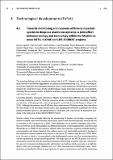Por favor, use este identificador para citar o enlazar a este item:
http://hdl.handle.net/10261/272159COMPARTIR / EXPORTAR:
 SHARE
BASE SHARE
BASE
|
|
| Visualizar otros formatos: MARC | Dublin Core | RDF | ORE | MODS | METS | DIDL | DATACITE | |

| Título: | Towards monitoring and recovery of fishery impacted species in deep-sea marine ecosystems: a joint effort between biology and technology within the Mediterranean BITER, PLOME and LIFE-ECOREST projects |
Autor: | Aguzzi, Jacopo CSIC ORCID ; Navarro, Joan CSIC ORCID ; Grinyó, Jordi CSIC ORCID; Masmitja, Ivan CSIC ORCID; Bahamon, Nixon CSIC ORCID ; García, José A. CSIC ORCID ; Vigo Fernandez, María CSIC ORCID ; Recasens, Laura CSIC ORCID ; Chatzievangelou, Damianos CSIC ORCID; Robinson, Nathan J. CSIC ORCID; Falahzadeh, Ahmad; Río, Joaquín del CSIC; Gomáriz, Spartacus; Carreras, Marc; Palomeras, Narcís; Ridao, Pere; Oliver, Gabriel; López, Juan Manuel; Picardi, Giacomo CSIC ORCID; Company, Joan B. CSIC ORCID | Fecha de publicación: | 4-abr-2022 | Editor: | International Council for the Exploration of the Sea | Citación: | Working Group on Nephrops Surveys (WGNEPS outputs from 2021) 4(1): 22-23 (2022) ICES Scientific Reports 4(29): 22-23 (2022) |
Resumen: | The trawling fishing activity constitutes today half of all EU fisheries and its use is one of the main drivers of ecosystem degradation of demersal ecosystems (Puig et al., 2012). Trawling removes the sediments and endangers demersal fragile sessile organisms, being long-lived species replaced by short-lived ones. In the Mediterranean, many demersal stocks are overexploited, reducing the economic benefits of fisheries and the ecosystem services associated with cultural aspects of iconic species. Given this situation, ecological networks of Marine Protected Areas (MPAs) as no-take reserves, are being created to preserve Nephrops norvegicus stocks, according to the principles of habitat connectivity, with appropriate scales of geographic proximity for larval dispersal (Vigo et al. 2021). Although the primary aim of MPAs is the conservation of Nephrops stocks, they also allow the recovering of the associated sessile fauna, that trapping the sediment accelerates the whole habitat restoration process. The repopulation of soft bodied cold water corals by badminton technique is the main goal of the LIFE-ECOREST Project. [...] | Descripción: | 2 pages | Versión del editor: | https://doi.org/10.17895/ices.pub.19438472 | URI: | http://hdl.handle.net/10261/272159 | DOI: | 10.17895/ices.pub.19438472 | Identificadores: | issn: 2618-1371 |
| Aparece en las colecciones: | (ICM) Informes y documentos de trabajo |
Ficheros en este ítem:
| Fichero | Descripción | Tamaño | Formato | |
|---|---|---|---|---|
| Aguzzi_et_al_2022.pdf | 1,31 MB | Adobe PDF |  Visualizar/Abrir |
CORE Recommender
Page view(s)
69
checked on 15-may-2024
Download(s)
22
checked on 15-may-2024
Google ScholarTM
Check
Altmetric
Altmetric
Este item está licenciado bajo una Licencia Creative Commons

